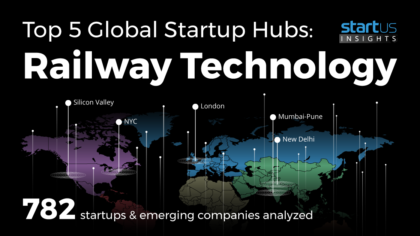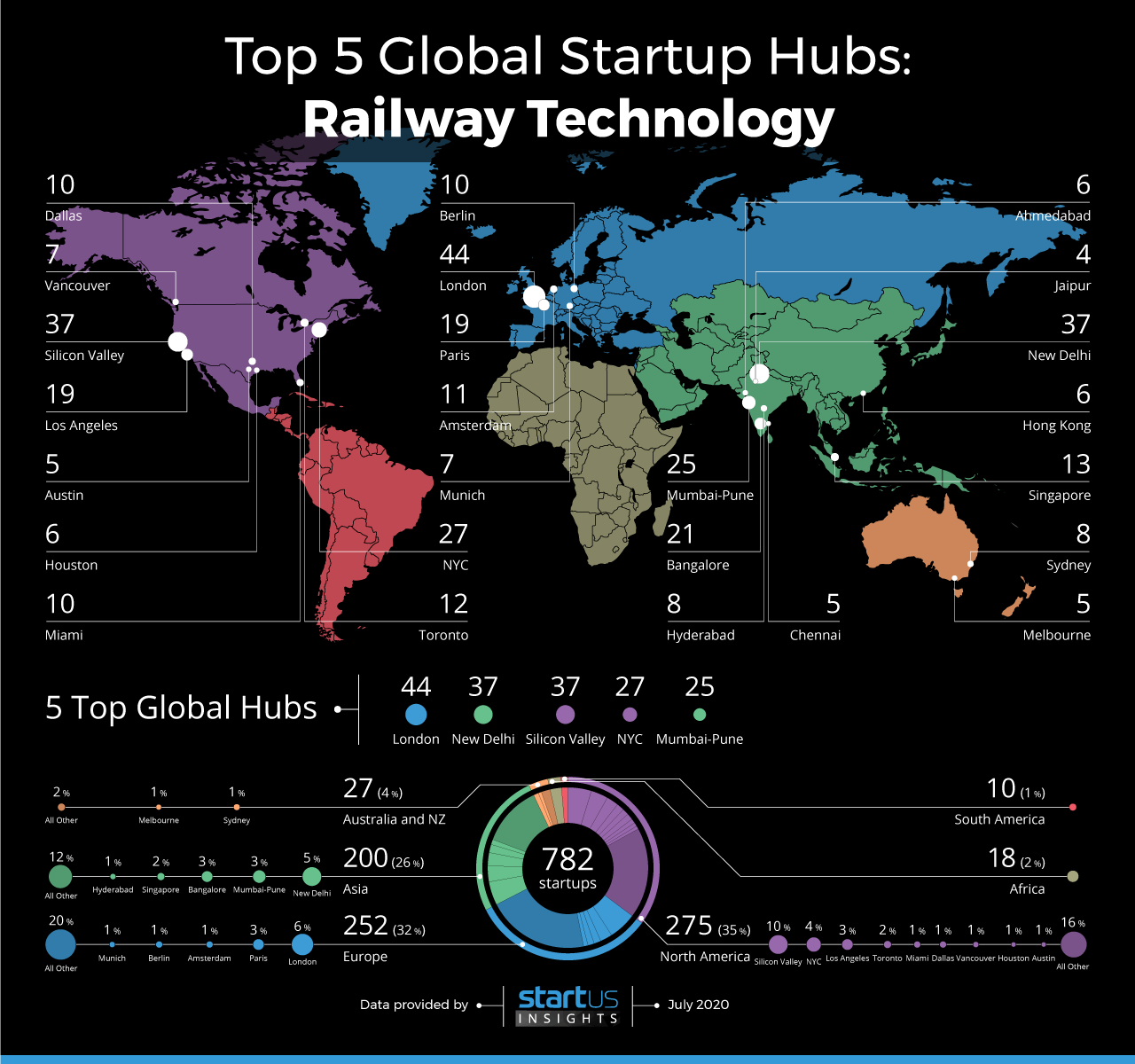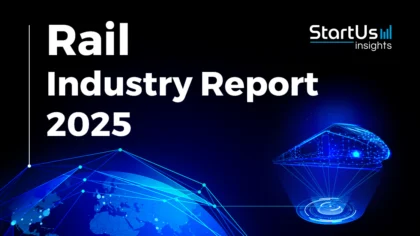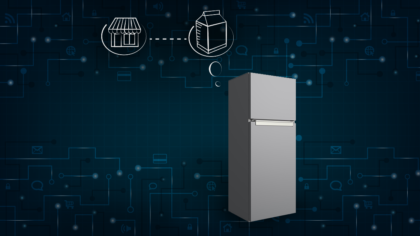Accelerate Productivity in 2025
Reignite Growth Despite the Global Slowdown
The railroad sector is undergoing numerous changes in response to the growing demand for fast transportation between cities and countries. Rail tech spans drones and smart sensors for inspecting railway tracks, digital commuting platforms, and automatic train control (ATC). Notoriously slow to implement modern technologies, the rail tech startups are working to scale various solutions that look to combine biometric information, artificial intelligence (AI), and cloud computing. At the train operator level, emerging railroad companies utilize the Internet of Things (IoT) devices to implement predictive maintenance and monitor for any anomalies.
Top 5 Global Rail Tech Startup Hubs
Using our StartUs Insights Discovery Platform, we analyzed the geographic distribution of global activity in the railway sector. We identified 50 regional hubs* that observe high activity in developing technology-driven solutions across the industry such as drone-based inspections, smart IoT sensors, augmented reality, and advanced analytics, to name a few.
Within the hubs, we analyzed a sample of 782 startups* employing technology-driven solutions to innovate in the industry. London, New Delhi, Silicon Valley, New York City, and Mumbai – Pune are home to 170 startups and account for 22% of global RailTech activity. Let us have a look at some of the innovative solutions from these 5 top hubs.
Based on a sample of 782 startups and scaleups, we observe that global rail tech startup activity is roughly evenly spread across North America, Europe, and Asia, each hosting around a third of all startups. The US and India are large hubs for rail tech startups, with each country home to 15% of all startups. Rail tech hubs in Europe are spread across the UK, France, Netherlands, and Germany.
1. London: 44 Startups
Rail tech innovation in the UK has received a boost in recent times, with large-scale expansion and upgrades planned for the whole country. The UK is also building its first high-speed rail project, one of just a handful globally. Home to the Tube, London’s network of surface-level and underground subway systems are also scheduled for upgrades. At the same time, a recent government-led innovation competition picked winners working to develop 5G WiFi infrastructure, hydrogen-powered freight trains, and a seat-switching app. Moreover, the industry also aims to implement technology that enables cleaner and more sustainable rail transportation systems.
London-based startup Route Reports develops a rail condition monitoring platform. This platform helps infrastructure owners collect train and track data by fitting regular trains with devices and gathering vibration data. With this data, Route Reports identifies and predicts which parts of the track require urgent maintenance. Moreover, predicting track health allows train and track operators to proactively identify and fix faults before they worsen.
2. New Delhi: 37 Startups
Delhi’s rapid transit system is the biggest in India and has close to 2.5 million riders every day. That number is bound to increase with its plan to expand and cover more than 400 km (~250 mi) in track length. Moreover, trains play a crucial role in connecting New Delhi with various surrounding industrial and commercial cities. With the conversation ranging from semi high-speed to high-speed rail, hyperloop, and modern infrastructure, emerging rail tech companies in this hub create diverse solutions.
New Delhi-based Aveli Global Engineering Solutions (AGES) offers innovative technologies for rapid rail transportation. Some of these innovations include tokenless, multi-aspect light, and automatic signaling, as well as interlocking and connectivity solutions. Also, the startup provides traditional railway services such as track infrastructure and basic signaling systems.
3. Silicon Valley: 37 Startups
The high-speed rail project connecting the south and north of California dominates the conversation in the industry. However, the Bay Area is also working to improve the management of its heavy rail network and to expand it with several phased expansions. Despite some delays and high investment in the region, rail tech startups from Silicon Valley provide innovative solutions to monitor the rail lines, better engage with passengers, and even to manage potential disasters that are common to the region.
Based out of Campbell, Anagy is a cleantech startup developing novel electric propellent-less systems. The early-stage startup is currently researching QuantumLoop, an inertia propulsion-based system. It aims to enable continuous high-speed acceleration in a closed non-polluting system. The technology finds applications in all forms of transportation, including railroads.
4. New York City: 27 Startups
With around 1.100 km (700+ mi) of track connectivity, the New York City subway system is one of the largest in the world. Providing mass connectivity between its central business districts with major surrounding suburbs, New York City startups are working to improve passenger experiences. Moreover, rail tech companies in this hub are helping implement a re-equipment project that includes signaling and communications equipment, as well as a gradual overhaul of its fleet, with modern rail technologies.
Mindsay specializes in creating chatbots, or virtual assistants, for various industries, including for railways. The startup offers conversational AI and robotic process automation (RPA) solutions to automate a significant portion of passenger train travel-related tasks. Mindsay’s railway chatbots perform tasks that include ticket booking assistance, train information, refunds, claims, and compensations, as well as customer loyalty programs. This solution frees up time for railway agents who are able to focus on more important tasks.
5. Mumbai: 25 Startups
The Mumbai suburban local train system experiences a daily ridership of more than 7 million people. The large volume makes it almost impossible to plan and implement suitable upgrades and overhaul inefficient railway systems. Indian and Mumbai-based startups are working to solve challenges relating to crowding, scheduling, and rail infrastructure inspection and surveying to improve passenger experiences.
DRONITECH provides train and track operators with unmanned aerial vehicles (UAVs), or drones, to map and monitor rail lines. These drones feature ultra-high-definition (HD) cameras that generate precise thermographic aerial images and videos. The startup provides a comprehensive mapping of the inspected object’s technical condition. Further, DRONITECH provides relevant stakeholders with real-time inputs regarding track safety and maintenance.
What’s Next?
The recent uncertainty caused due to the coronavirus pandemic potentially slows down innovation in railroads. However, it also presents startups with opportunities to find ways to improve cost-effectiveness and efficiency for train operators and manufacturers. With the world forced to devise sustainable and safe travel options to move forward, emerging rail tech startups are looking to solve some of the challenges that plague the industry that already existed before the pandemic.
*We define a hub as the regional geographic center of activity for this topic. It covers the center point with a radius of 100km. For this report, we define startups as those founded after 2015.








